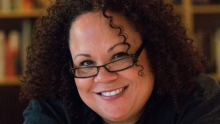Ken wonders if the idea of a “fractured self” makes sense. As a foodie, black person, and sports fan, Ken considers these aspects of his identity to synthesize into a coherent “Ken.” Josh, on the other hand, doesn’t think that a person’s sense of belonging and inner coherency are always “synthesized” so simply. Both note that W.E.B. Du Bois’s analysis of “double consciousness” in the black American — whereby one is conflicted between “two spiritual strivings,” one black and one American — is a famous concept that illustrates a kind of fractured self.
Ken and Josh welcome Julie Lythcott-Haims, author of Real American: A Memoir, to the show. Ken asks Julie: do you remember the first moment in your life when you experienced yourself as fractured? Julie delves into her childhood as a daughter of a black father and white mother, and as a child born soon after the Loving v. Virginia ruling of 1967, which legalized interracial marriage in the United States. Julie adds that although her black identity was “foisted” on her as a child, she identified as biracial in her mid-twenties to “flee” her blackness. However, since then, Julie has come to accept herself both as a biracial and black woman.
In the last segment, Ken asks Julie if society should aim to drop the black-white binary as people of non-conforming gender identities are working to disrupt the gender binary. He wonders if Julie, and other mixed race people who defy the black-white binary, should be the vanguard of changing how race is talked about and conceived. But Julie thinks that the comparison between race and gender is not as close as Ken thinks, and she says the same to Josh, who proposes that bisexuality might be more similar to biraciality. Nonetheless, Julie emphasizes that sexuality is often an identity that people choose to disclose. Race, on the other hand, is an aspect of our identities that can be perceived and even “foisted on us” anywhere.
- Roving Philosophical Reporter [Seek to 5:45] — Liza Veale interviews American immigrants from Germany, Brazilian, and India who identify differently from how they are racially identified in America. She also talks to philosopher Kwame Anthony Appiah who adds that even people who bear multifaceted identities are treated based on how they look.
- Sixty-Second Philosopher [Seek to 46:35] - Ian Shoales questions if white identity is a coherent identity.




Comments (1)
Reinadylan
Tuesday, April 22, 2025 -- 3:46 AM
Exploring fracturedExploring fractured identities has been a deeply personal journey for me. It’s about navigating the spaces between cultures, roles, and expectations. I’ve learned adult night care near me Studio City to embrace the complexity rather than seek a singular definition. This perspective has enriched my self-awareness and helped me connect more authentically with others facing similar experiences.